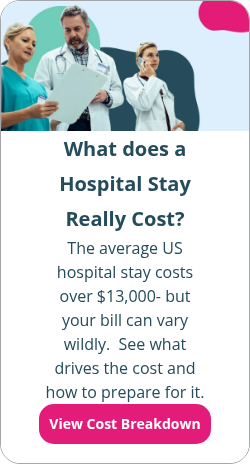What is critical illness insurance?
By Holly Bengfort on November 22, 2023 at 4:45 PM
We're often told to expect the unexpected in life. But, a 2023 Bankrate report1 found that nearly one in four Americans have no emergency savings.
A medical emergency can strike at any time, and the financial burden that comes with it can be overwhelming. Many assume that health insurance will cover these costs, but treatment for life-threatening illnesses can exceed what your plan covers. Critical illness plans aim to ease that burden by providing you with much-needed money in the event of a covered diagnosis.
In this article, we'll explain what critical illness insurance is, when you might need it, how it differs from regular health insurance, and how much it costs.
How does critical illness insurance work?
A critical illness policy provides financial protection in a life-changing event where you're diagnosed with a major illness or medical condition. Unlike traditional health insurance, which typically covers a share of your medical care expenses, critical illness insurance gives you a lump sum payment upon diagnosis of a covered illness. Depending on your policy, coverage limits can range from a few thousand dollars to $100,0002.
You can use the benefit payment as you see fit, whether it's to cover out-of-pocket costs, pay for necessary treatments, or even take time off work to focus on your recovery. You can also use your cash payout to cover your mortgage, rent payments, or child care while you recover.
However, there are limitations to this type of coverage. It doesn't cover pre-existing conditions, so you must apply for coverage before getting sick.
When would you need it?
One of the key benefits of critical illness insurance is that it provides a safety net during a time of significant emotional and physical stress. When faced with a serious illness, the last thing you want to worry about is how you're going to pay your bills or afford the necessary treatments.
You should also consider getting critical illness insurance if you have a family history of serious conditions like heart disease.
So, what does critical illness insurance cover?
The specific illnesses covered vary depending on the insurance provider and policy, but common eligible conditions typically include:
- Heart attacks
- Strokes
- Some types of cancers
- Renal failure (kidney failure)
- Major organ transplants
Some policies also provide coverage for:
- Severe burns
- Paralysis
- Comas
- Loss of hearing
- Coronary bypass surgeries
- Significant neurodegenerative conditions such as multiple sclerosis (MS), amyotrophic lateral sclerosis (ALS or Lou Gehrig's disease), or Parkinson’s disease
How does it differ from regular health insurance?
Another advantage of critical illness insurance is its flexibility in how you can use the funds. While a traditional health insurance plan helps pay for your medical expenses, a critical illness insurance plan gives you the freedom to use that money as you see fit. This means you can use it to pay for medical treatments that may not be covered by your medical plan or for any other out-of-pocket expenses that may arise during your unexpected illness.
It's important to note that a critical illness insurance policy is supplemental insurance coverage. It doesn’t replace primary medical insurance. Instead, it complements it by providing additional financial protection for specific critical illnesses. Having both types of coverage can help ensure that you have the most protection possible in the event of a serious illness.
How much does it cost?
The monthly cost of this coverage increases as you age and as the benefits become more comprehensive.
For example, someone in their 20s could potentially secure basic critical illness coverage for a few dollars a month, while more comprehensive coverage might cost less than $50 a month. However, for someone in their late 50s, a $50 monthly premium may only provide a minimal amount of basic critical illness coverage. Critical illness plans also come at an additional cost to smokers.
Where can you buy it?
If your employer doesn't offer critical illness coverage, you'll have to shop around for your own policy. Since it's supplemental health insurance, you won't find these plans on the Marketplace. You'll need to go directly to the insurance companies. You can also obtain critical illness coverage through a life insurance policy.
When considering this type of insurance, it's important to carefully review the policy details, including the coverage limits, waiting periods, and exclusions. It's also important to compare quotes from multiple insurance providers to ensure you're getting the best coverage at the most affordable price.
What are your alternatives for coverage?
If critical illness insurance isn't the right fit for your situation, you have some alternative options.
Here are some other considerations for coverage:
- Health reimbursement arrangement (HRA): HRAs are employer-funded health benefits that allow tax-free reimbursement for qualifying medical expenses, including insurance premiums and out-of-pocket costs. If your employer offers you an HRA, you can take advantage of it by submitting your medical expenses for reimbursement.
- Health savings account (HSA): An HSA is a savings account specifically designed for high-deductible health plans (HDHPs) that allows you to save money for future healthcare expenses. HSA funds can accumulate and be carried over into the future years and are portable, meaning you can take it with you if you change jobs. This allows you to save up for future medical emergencies.
- Flexible spending account (FSA): An FSA is an employer-sponsored arrangement you can use to cover out-of-pocket healthcare expenses, including copayments and coinsurance. You don’t pay taxes on contributions to your FSA, but you generally can't carry over funds to the next year unless your employer allows it.
- Disability insurance: Disability insurance offers income replacement if you're unable to work due to a disability. There are short-term and long-term options available.
- Hospital indemnity insurance: This supplemental coverage provides cash benefits for expenses incurred during a hospital stay.
- Accident insurance3: Accident insurance covers medical costs related to accidents or injuries.
Conclusion
Critical illness insurance is a valuable form of supplemental coverage that can provide financial protection during a time of serious illness. Offering a lump sum cash benefit upon diagnosis of a covered condition helps alleviate some of the unexpected costs associated with medical expenses and treatments. While it doesn't replace traditional health insurance, critical illness insurance can provide added peace of mind and security for you and your loved ones.
Check out more resources
See these related articles

What is accident insurance?
Accident insurance provides financial protection if you have an unexpected injury. Learn more about what accident insurance covers and why it's important.

Which premiums can a QSEHRA reimburse?
Find out which premiums a QSEHRA can reimburse, including health insurance and more. Learn how employers can offer tax-free reimbursements.

How to offer supplemental dental insurance
Supplemental dental insurance can provide additional coverage for costly dental procedures. Find out how you can offer this important benefit to your employees today!



